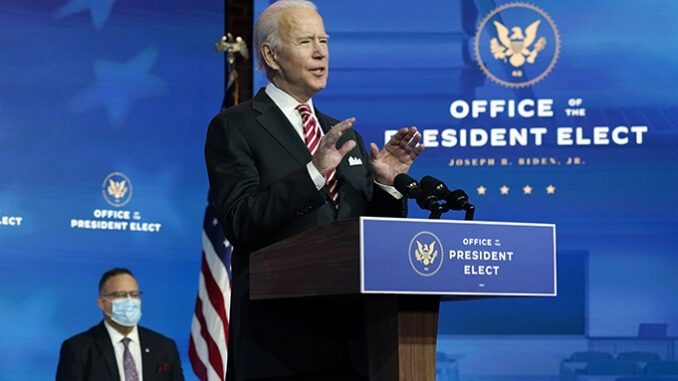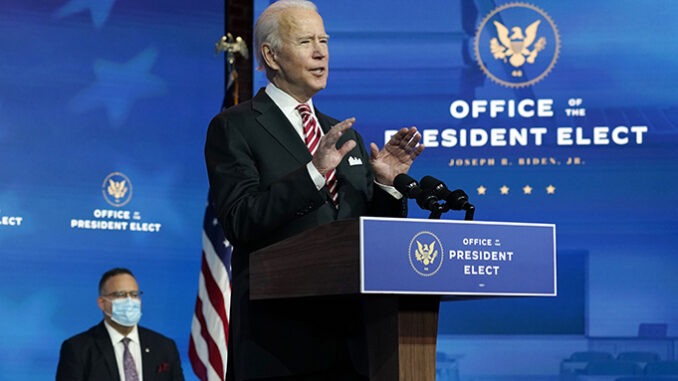

RALEIGH — With the incoming Biden administration signaling it will be more hostile to school choice initiatives, the future may be uncertain for an executive order issued on Dec. 28, 2020, by President Donald Trump expanding school choice options to counter school closures during the pandemic.
“The prolonged deprivation of in-person learning opportunities has produced undeniably dire consequences for the children of this country,” the order reads.
The executive order would allow states to use Community Services Block Grant (CSBG) funds to grant “emergency learning scholarships” to disadvantaged families. The order follows the passage of a new $900 billion coronavirus relief package signed by President Trump.
The scholarships can be used for tuition and fees for a private or parochial school, or be used for homeschooling, micro-school or learning-pod costs. Tutoring and remedial education costs also apply.
Perhaps most importantly, the scholarships can also be used by students with special education needs for services and therapy.
“Unfortunately, more than 50% of all public-school students in the United States began school remotely this fall,” says the order. “These children, including those with special needs, are being underserved due to the public education system’s failure to provide in-person learning options.”
The CSBG’s are funded up to $775 million for fiscal year 2021 and are typically used for various programs that benefit or aid low-income communities such as nutrition, health care, and housing needs but the funds can be also used for education purposes.
The CDBG funds are usually administered by state health and human services departments. In North Carolina, the N.C. Department of Health and Human Services (NCDHHS) administers the funds. In an email, North State Journal asked NCDHHS about the order but has not yet received a response.
President-elect Joe Biden’s public statements in the realm of education indicate he will seek to dismantle school choice options involving charters and vouchers promoted by the Trump administration.
At a December 2019 education forum held in Pittsburgh, Pennsylvania, Biden told attendees “And so, the point is, if I’m president, [Education Secretary] Betsy DeVos’ whole notion from charter schools to this are gone.”
Earlier in 2020 at an endorsement event by the National Education Association (NEA), Biden said “No privately funded charter school — or private charter school — would receive a penny of federal money.”
At a July 2020 NEA event, Biden seemed to indicate unions were in the driver’s seat in his administration.
“When we win this election, we’re going to get the support you need and the respect you deserve,” Biden said. “You don’t just have a partner in the White House, you’ll have an NEA member in the White House.”
At the same event, Biden seemed to suggest that teachers, not students, were the priority, stating that his administration “is going to be a teacher-oriented Department of Education.”
Biden selected Connecticut’s education Commissioner Miguel Cardona as his education secretary nominee. The choice was praised by the presidents of the nation’s two largest teachers’ unions.
In his remarks after being selected, Cardona said, “It should not take a pandemic for us to realize how important teachers are this country. We must embrace the opportunity to reimagine education — and build it back better.”
Biden has vowed to reopen most schools in “the first 100 days” of his administration although the incoming president does not possess that authority. Biden says he will reopen schools by sending more funding for school districts to implement COVID-19 safety protocols. Biden has not indicated how much funding that might be. K-12 education has already received nearly $68 billion additional funding between the CARES Act and the passage of the most recent COVID-19 relief package.
Passed in March of 2020, the $2 trillion CARES Act allotted $13.5 billion in relief money specifically for K-12 education and another $3 billion for governors to use as they saw fit for K-12 and higher education via the Governor’s Emergency Education Relief (GEER) Fund.
North Carolina received around $431 billion in CARES Act funds for education. In August, Gov. Roy Cooper allocated $95.6 million from GEER to aid K-12 and post-secondary education due to the pandemic.
The $900 billion COVID-19 relief bill, passed in late December and signed by Trump, includes $54.3 billion for K-12 schools. Higher education will receive around $22.7 billion. Another $4 billion will go to the GEER Fund, $2.7 billion of which goes to private schools.



